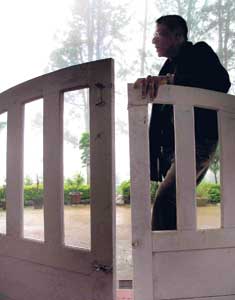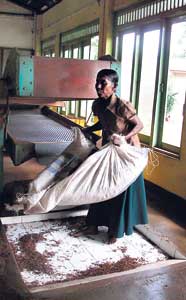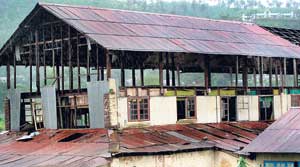The relief and the pleasure you get when you complete the book that you are writing, is like the final moments in a dalliance with a pretty woman whom you have been able to get into the bedchamber.
I had just finished writing ‘The Suicide Club’ which deals with the pre and postcolonial era of life on the plantations. The anecdotes and stories have never been told before and they all relate to true incidents. ‘The Suicide Club’ and its mysteries will have to be left as a surprise to the reader.
But my relief and pleasure was short-lived. My publisher Juliet Coombe from Sri Serendipity told me one day as I was savouring my freedom from endless re-writes ‘You must take me to every plantation that you worked on.’ I thought I could slip through this tackle, busy as I am running my own plantation Hadunugoda and the delightfully stunning ‘fortress in the sky’ Mirissa Hills. It was not to be. She mounted the pressure till I eventually relented and we embarked on a journey to the hill country.
 |
| Into the misty past: Herman goes back four decades |
Juliet, her baby Amzar and I set off; her book designer Kavinda was to join us later with her features/news writer Rathindra. Having written three previous books I was wondering what all this fuss was about.
The first place we visited was Ury Group, Passara where the Chairman of the Dunsinane Company Sir John Arbuthnot had sent me for a ‘change of scenery’. Change of scenery was a euphemism used to describe a compulsory punitive transfer.
Succumbing to Juliet’s pressure I had no time to inform the managers of the respective estates that we would be descending on them. I pleaded this as an excuse to Juliet to postpone the trip. ‘That’s ok; we will go all the same. You take me to the places, I will take the photographs that will bring the book to life.’ No respite from her. ‘These darn English’ I thought and acquiesced.
An international photojournalist for over a decade, Juliet has been zeroing into war zones and taking pictures is her forte. The plantations to her, was as easy as falling off a log. We encountered no difficulties. The Managers were full of courtesy and went out of their way to assist us.
Jayantha Hulangamuwa, Manager of Ury Group showed us his bungalow and the estate office, which is referred to in The Suicide Club. He also accompanied us to my old bungalow, the Ury senior assistant’s residence. Ury was run very well and it warmed my heart to see this estate in such good condition. The old problems still existed, he told me, due to the proximity of Ury to the villages.
We were to rest our tired bones at Warwick Gardens at Ambewela. Before that we visited the Hill Club, Nuwara Eliya and the Golf Club. We were gently told at the Hill Club that we could not enter as Juliet’s child was below 5 years of age, but could have lunch at the chalet of the club. The Hill Club operates so efficiently and maintains the old standards, we were told because of the strict adherence to rules incorporated by the founding fathers. This we could understand.
The Golf Club was the next destination for photographs as it is mentioned in The Suicide Club. After cheese toast and tea, we set off to Jetwing Warwick Gardens at Ambewela. The moment we stepped into Warwick I realized that I had been there before. Warwick was a plantation belonging to the wealthy Sri Lankan family of Percy Fernando who was also connected to my family. George Wickramasuriya was the Superintendent almost 50 years ago when I visited Warwick with my father. I went to Warwick again 25 years later on being told that it was for sale.
Warwick today belongs to Hiran Cooray, Chairman of the Jetwing Group of Companies, leading hoteliers in Sri Lanka. Warwick is Hiran’s personal creation and an indication of what is possible and great about this island.
Warwick Gardens bungalow has a special significance to Sri Lanka’s heritage specialists. It symbolizes and exemplifies a 19th Century plantation bungalow. These vanishing plantation bungalows are just as much our heritage as the ancient ruins in Anuradhapura and Polonnaruwa. I had last seen it 25 years ago and what Hiran has done with it defies description. The only thing missing was an old Scotsman emerging from the bungalow, smoking his pipe with a pack of hounds following him.The re-creation was almost perfect. All plantation companies must send their Managers and Assistant Managers to inspect Hiran’s handiwork. It has been recreated to exactly what it was when we had the privilege of working in the Plantation Raj.
 |
| Woman power at Handunugoda: Tea is nothing without the people |
I did not know Hiran Cooray till I launched Sri Lanka’s most recent tea book Generation T: The Ultimate Guide to Sri Lankan Tea, at the Casa Colombo under his chairmanship. I was glad to have visited Warwick. This national heritage has to be preserved and we need to take a lesson from Hiran. It is easier to preserve these bungalows now, rather than wait for them to assume ruined status before making feeble attempts at restoration. This can be a job for Hiran Cooray.
Warwick is the idyllic spot for a holiday, with an enthusiastic and first class Manager Faris who is a fountain of knowledge of the area. The morning walks are very special and one is hurtled headlong into the days of the old Raj.
With Juliet there was no respite and we were not allowed to savour this lovely restoration. Cameras, computers, her cute baby and all were huddled into our four wheel drive and we moved next to St Clair Estate, Talawakelle, a plantation on which I had worked for a very short period. From St Clair it was next to Queensberry in Kotmale, where Juliet took some very unusual photographs and even used her computer to recreate sepia-toned pictures. Watching her lying on floors, climbing on top of things to get a better angle or getting up close to things taking the weirdest of objects means there was never a dull moment. ‘You never know when an old colonial carpet pattern will come in handy, a carved toilet seat handle will add a talking point to the book, a rusty Victorian lock in a colonial chest an opening chapter shot, or a light fitting for a spot of inspiration complete with wires and cobwebs might also come in handy to give The Suicide Club both texture and depth,’ Juliet would say.
Is she mad, I thought. But as Kavinda created the pages of my book on location, picking up elements of each place from my life - from the people to the very fabric of the buildings we explored from top to bottom, I realized that this is what publishing should really be about.
As we travelled from plantation to plantation Juliet kept asking ‘what memories are re-kindled in you on these visits?’ I would have preferred not to answer her. I have never re- visited a plantation that I worked on ever before. They bring back joyous and sometimes sad memories. I never live in the past and I would rather not think about the good times or the bad. The past as far I was concerned was behind me. I only look to the future. Too many people in our land live in the past.
From Queensberry it was on to Harrow Estate, Punduloya. Harrow is a guest bungalow.
I completely disapprove of this beggarly concept of converting plantation bungalows into guest houses. The manager’s bungalow is the symbol of authority. It was large, grand and usually sat on top of a hill commanding a view of the whole estate. If the manager does not occupy the bungalow that was meant for him, he no longer is the King who governs the estate. Sri Lankans like in most matters seem to have got it wrong. What the plantation loses from this conversion to guest houses is unquantifiable. The gain in the form of accommodation rentals is merely a pittance. Harrow was in this sad position. The Harrow factory that made very good tea is shut down.
 |
| A common sight: Fifty per cent of the factories have been shut down |
The next visit was to Dunsinane, which is really the crown jewel in the plantations. I served this estate both as an assistant superintendent and later as manager. We were welcomed most warmly by Manager Senarath Pahatakumbura. Dunsinane was like a picture postcard. It always has been. Lush, manicured and well managed, it warmed the cockles of my heart to see the estate so. The bungalow was in impeccable condition. Nobody had walked away with the immensely valuable pieces of furniture that were a legacy from the past.
It was now the home run back to the Ruhuna. On the way we visited Narangalla Group, Aranayaka, where I had taken my first faltering steps into the Plantation Raj. The bungalow was no more. The jungle had swallowed it up. When we finally located the Narangalla Bungalow all we saw was a huge hole in the wall where my bedroom had been. The factory was used for washing clothes and hanging them up to dry. It was no more.
It was then to Yataderia Estate, Undugoda that we finally travelled. I had lived and worked from the Yataderia Division assistant superintendent’s bungalow. I was told at the estate office that this bungalow had been handed over to a Buddhist monk. We went there all the same. I could not believe what I saw. The bungalow was indeed the residence of a Buddhist monk. The tea lands were apparently taken over by squatters. The division comprising the best low country tea was no more. This entire estate was owned by the Yataderia Sterling Company for over 140 years, and how a Buddhist monk could lay claim to it I cannot fathom.
What of the Plantation Raj, you may wonder. The picture I saw was grim. Tea crops have declined dramatically. Huge well-equipped factories have been shut down. Privatisation of the plantations has been a failure and if this trend continues this most enduring legacy that has been bequeathed to us by the colonial powers will be no more.
This government and new minister Mahinda Samarasinghe must immediately make a critical assessment of the plantations. Now. Not one day later. Minister Samarasinghe himself comes from a plantation background. The industry seems to accept him as a sober, mature and well-meaning politician. He has the qualifications to make the hard and tough choices. If he does not do that it will be another example of Sri Lanka destroying the cornerstone of the country’s economy.
‘Those who matter do not care and those who care do not matter’. |
